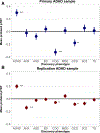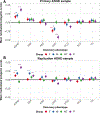Investigating Direct and Indirect Genetic Effects in Attention-Deficit/Hyperactivity Disorder Using Parent-Offspring Trios
- PMID: 35933166
- PMCID: PMC10369485
- DOI: 10.1016/j.biopsych.2022.06.008
Investigating Direct and Indirect Genetic Effects in Attention-Deficit/Hyperactivity Disorder Using Parent-Offspring Trios
Abstract
Background: Attention-deficit/hyperactivity disorder (ADHD) is highly heritable, but little is known about the relative effects of transmitted (i.e., direct) and nontransmitted (i.e., indirect) common variant risks. Using parent-offspring trios, we tested whether polygenic liability for neurodevelopmental and psychiatric disorders and lower cognitive ability is overtransmitted to ADHD probands. We also tested for indirect or genetic nurture effects by examining whether nontransmitted ADHD polygenic liability is elevated. Finally, we examined whether complete trios are representative of the clinical ADHD population.
Methods: Polygenic risk scores (PRSs) for ADHD, anxiety, autism, bipolar disorder, depression, obsessive-compulsive disorder, schizophrenia, Tourette syndrome, and cognitive ability were calculated in UK control subjects (n = 5081), UK probands with ADHD (n = 857), their biological parents (n = 328 trios), and also a replication sample of 844 ADHD trios.
Results: ADHD PRSs were overtransmitted and cognitive ability and obsessive-compulsive disorder PRSs were undertransmitted. These results were independently replicated. Overtransmission of polygenic liability was not observed for other disorders. Nontransmitted alleles were not enriched for ADHD liability compared with control subjects. Probands from incomplete trios had more hyperactive-impulsive and conduct disorder symptoms, lower IQ, and lower socioeconomic status than complete trios. PRS did not vary by trio status.
Conclusions: The results support direct transmission of polygenic liability for ADHD and cognitive ability from parents to offspring, but not for other neurodevelopmental/psychiatric disorders. They also suggest that nontransmitted neurodevelopmental/psychiatric parental alleles do not contribute indirectly to ADHD via genetic nurture. Furthermore, ascertainment of complete ADHD trios may be nonrandom, in terms of demographic and clinical factors.
Keywords: ADHD; Case-control design; Genetic nurture; Missing data; Polygenic risk scores; Trio design.
Copyright © 2022 Society of Biological Psychiatry. Published by Elsevier Inc. All rights reserved.
Conflict of interest statement
Disclosures
All authors report no biomedical financial interests or potential conflicts of interest.
Figures


Comment in
-
Direct and Indirect Effects in Trio Studies: You Don't Know What You're Missing.Biol Psychiatry. 2023 Jan 1;93(1):6-7. doi: 10.1016/j.biopsych.2022.10.004. Biol Psychiatry. 2023. PMID: 36456078 No abstract available.
Similar articles
-
Estimating the impact of transmitted and non-transmitted psychiatric and neurodevelopmental polygenic scores on youth emotional problems.Mol Psychiatry. 2024 Feb;29(2):238-246. doi: 10.1038/s41380-023-02319-1. Epub 2023 Nov 21. Mol Psychiatry. 2024. PMID: 37990052 Free PMC article.
-
Association of Genetic Risk Variants With Attention-Deficit/Hyperactivity Disorder Trajectories in the General Population.JAMA Psychiatry. 2016 Dec 1;73(12):1285-1292. doi: 10.1001/jamapsychiatry.2016.2817. JAMA Psychiatry. 2016. PMID: 27806167 Free PMC article.
-
Identification of Two Heritable Cross-Disorder Endophenotypes for Tourette Syndrome.Am J Psychiatry. 2017 Apr 1;174(4):387-396. doi: 10.1176/appi.ajp.2016.16020240. Epub 2016 Nov 4. Am J Psychiatry. 2017. PMID: 27809572 Free PMC article.
-
Polygenic Risk Scores Derived From a Tourette Syndrome Genome-wide Association Study Predict Presence of Tics in the Avon Longitudinal Study of Parents and Children Cohort.Biol Psychiatry. 2019 Feb 15;85(4):298-304. doi: 10.1016/j.biopsych.2018.09.011. Epub 2018 Sep 29. Biol Psychiatry. 2019. PMID: 30424865 Free PMC article.
-
Clinical and molecular genetics of ADHD and Tourette syndrome. Two related polygenic disorders.Ann N Y Acad Sci. 2001 Jun;931:50-83. doi: 10.1111/j.1749-6632.2001.tb05773.x. Ann N Y Acad Sci. 2001. PMID: 11462757 Review.
Cited by
-
Investigating Gene-Environment Interplay Between Bereavement and Polygenic Risk for Attention-Deficit/Hyperactivity Disorder on Externalizing Behaviors During Adolescence.JAACAP Open. 2024 May 27;3(2):323-334. doi: 10.1016/j.jaacop.2024.04.006. eCollection 2025 Jun. JAACAP Open. 2024. PMID: 40520970 Free PMC article.
-
Examining intergenerational risk factors for conduct problems using polygenic scores in the Norwegian Mother, Father and Child Cohort Study.Mol Psychiatry. 2024 Apr;29(4):951-961. doi: 10.1038/s41380-023-02383-7. Epub 2024 Jan 16. Mol Psychiatry. 2024. PMID: 38225381 Free PMC article.
-
Abnormal Association Between Neural Activity and Genetic Expressions of Impulsivity in Attention-Deficit/Hyperactivity Disorder: An Adolescent Brain Cognitive Development Study.Biol Psychiatry Cogn Neurosci Neuroimaging. 2025 Jun 11:S2451-9022(25)00195-8. doi: 10.1016/j.bpsc.2025.06.002. Online ahead of print. Biol Psychiatry Cogn Neurosci Neuroimaging. 2025. PMID: 40514009
-
Using parent-offspring pairs and trios to estimate indirect genetic effects in education.Genet Epidemiol. 2024 Jun;48(4):190-199. doi: 10.1002/gepi.22554. Epub 2024 Mar 12. Genet Epidemiol. 2024. PMID: 38472165 Free PMC article.
-
Research Review: A review of the past decade of family and genomic studies on adolescent mental health.J Child Psychol Psychiatry. 2025 Jun;66(6):910-927. doi: 10.1111/jcpp.14099. Epub 2024 Dec 19. J Child Psychol Psychiatry. 2025. PMID: 39697100 Free PMC article. Review.
References
-
- Andersson A, Tuvblad C, Chen Q, Du Rietz E, Cortese S, Kuja-Halkola R, et al. Research Review: The strength of the genetic overlap between ADHD and other psychiatric symptoms – a systematic review and meta-analysis. J Child Psychol Psychiatry Allied Discip. 2020;61(11):1173–83. - PubMed
-
- Thapar A Discoveries on the genetics of ADHD in the 21st century: New findings and their implications. Vol. 175, American Journal of Psychiatry. American Psychiatric Association; 2018. p. 943–50. - PubMed
Publication types
MeSH terms
Grants and funding
LinkOut - more resources
Full Text Sources
Medical

